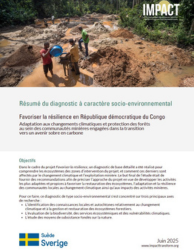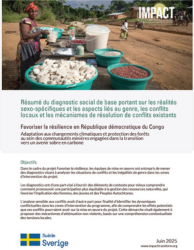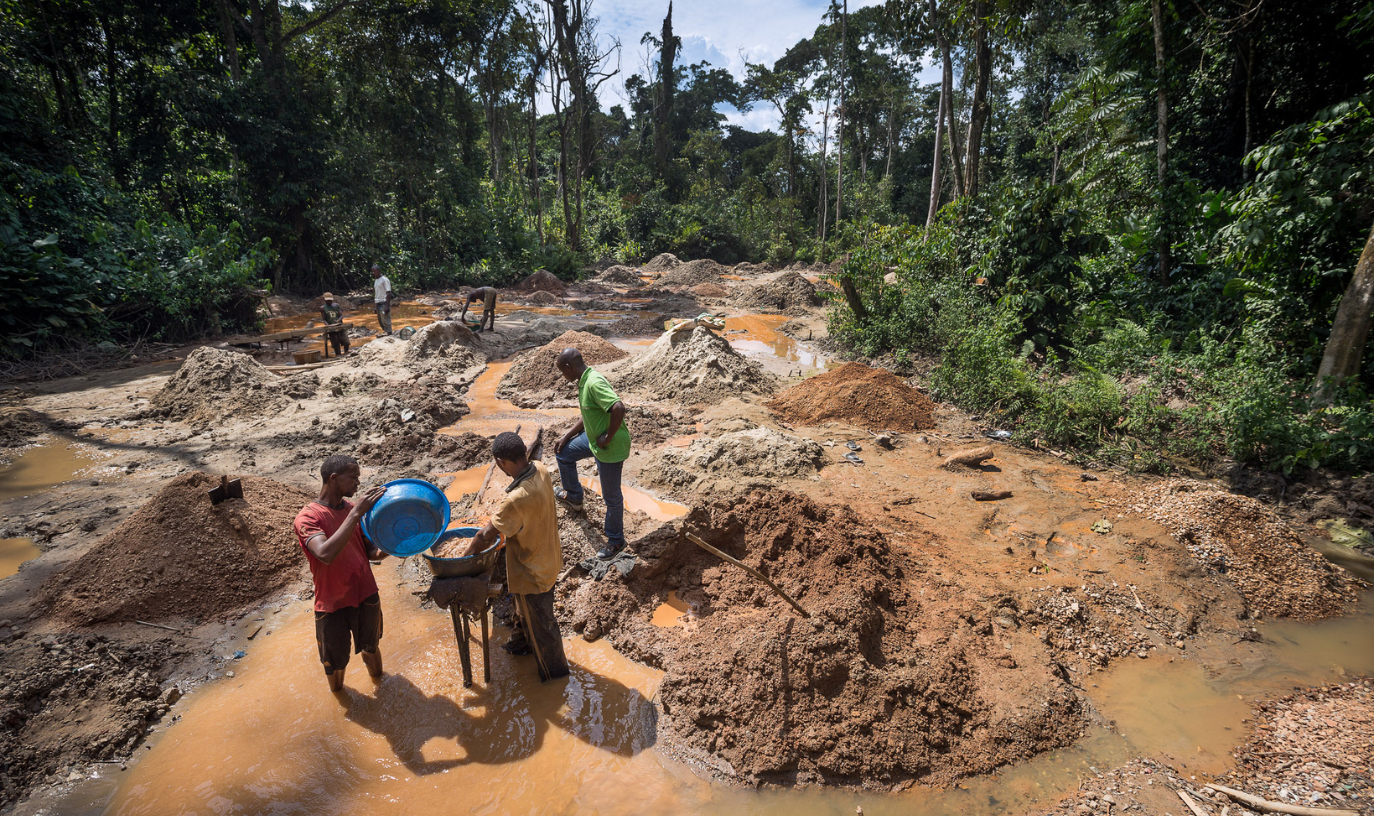Populations across Democratic Republic of Congo (DRC) are feeling the impact of climate change with high temperatures, increased rainfalls, and droughts affecting their daily life. Women and Indigenous Peoples are disproportionately affected by the loss of biodiversity.
Communities have been forced to adapt implementing various measures such as rotating crops or collecting and transforming more widely available non-timber forest products such as honey or mushrooms, as others disappear.
As part of the Powering Resilience project, IMPACT has completed a socio-environmental assessment to understand the ecosystems in the project intervention areas, and how these are affected by climate change and mining. The recommendations of the assessment will be used to determine the most appropriate and sustainable activities to promote ecosystem restoration and adaptation, while supporting communities to address the impacts of mining.
A second analysis examined gender and intersecting inequalities to better understand how to promote more equitable participation in natural resource management—especially women, youth, and Indigenous Peoples. It also looked at the conflict situation in the project areas to identify conflict dynamics to propose non-violent mitigation mechanisms, based on a contextualized understanding of local tensions.
The analysis took place across four provinces in DRC: northeastern provinces of Ituri and Tshopo, as well as southeastern provinces of Lualaba and Haut-Katanga.
Key Results and Recommendations: Socio-Environmental Assessment
The assessment highlighted common environmental issues common to all regions targeted by the project, such as:

- Threatened biodiversity in all areas of intervention, particularly in Ituri and Haut-Katanga, due to deforestation, mining, and slash-and-burn agriculture.
- River pollution linked to artisanal and large-scale mining.
- In all provinces, climate change is already having an impact on daily life and agricultural production: rising temperatures, irregular rainfall, flooding and drought.
The research identified the different vulnerabilities and adaptation strategies of local communities, as well as the knowledge of local populations and Indigenous Pygmies on ecosystem restoration. Research found that communities in Ituri and Tshopo are facing increased rainfalls and flooding, while their neighbours to the south have rising temperatures and droughts. Populations across the communities have developed a wide range of adaptation techniques to deal with the impacts of changing weather patterns, disrupted seasons, deforestation, biodiversity loss, and range of water issues.
The assessment identified several key recommendations including:
- Ecosystem-Based Adaptation (EbA) solutions that focus on ecosystem and biodiversity restoration and protection, as part of a strategy to help communities adapt to the negative impacts of climate change. Community-tailored solutions are recommended on agriculture, water, forests, and sustainable alternative livelihoods.
- Improving local governance and raising awareness on the regulations and policies in place to protect forest resources.
- Addressing pollution generated by mining for EbA strategies to be sustainable.
Read the full summary of the socio-environmental assessment (available in French only).
Key Results and Recommendations: Gender Inequality Analysis
The analysis revealed five key areas of gender inequality across the provinces:

- Unequal access to land with land tenure customs unfavourable to women.
- Women’s under-representation in local governance, despite their major role in economic activities.
- In mining, women are confined to informal and low-paying tasks.
- An increased exposure to gender-based violence in mining areas.
- Limited access to education for women.
The research also examined the barriers Indigenous People face, including barriers to land ownership and exclusion from decision-making bodies. The Indigenous Pygmies in Ituri and Tshopo Provinces, particularly those still living in the forest, face specific challenges linked to their nomadic lifestyle—such as accessing basic services.
Additionally, in the Indigenous Pygmy culture, land ownership has no value which complicated their integration into land and natural resource management systems. The research found that as they do not permanently own land, the Pygmy population are often marginalized and excluded from the economic opportunities available to other communities. And importantly, with increasing deforestation, the Indigenous Pygmy’s hunter-gather way of life is threatened.
The analysis also found that Pygmy women face double marginalization (due to their gender and Indigenous identity), preventing them from accessing opportunities and defending their rights.
The analysis identified key recommendations to support the empowerment and inclusion of women and Indigenous Peoples:
- Strengthening women’s leadership
- Transforming negative social norms
- Capacity building and empowerment
- Improving access to economic opportunities
- Advocacy and inclusion of marginalized groups including Indigenous Peoples
Read the full summary of the gender inequality analysis (available in French only).
Key Results and Recommendations: Conflict Analysis
The study found several main sources of conflict and tension across the provinces:
- Land related to controversial administrative boundaries, expropriation, and positioning for access to land and natural resources.
- Power related to authority or local governance.
- Identity related to community membership or differentiated land rights, resulting in tension between indigenous versus non-indigenous groups.
- Farmer-Herders linked to the movement of livestock responsible for the destruction of crops.
- Natural resource access, which is a source of major tension and exacerbated by inadequate governance frameworks and social disparities affecting vulnerable communities.
- Mining related to the lack of local economic support, tensions with foreign mining operators exacerbated by the use of foreign labour, expropriation of indigenous communities, management of mining concessions between industrial and artisanal miners, and pollution.
The study found that these conflicts and tensions have three key impacts on local communities:
- Social cohesion is weakened
- Increased feelings of injustice and marginalization
- Increased risk of violence, especially against women
The research found that any approach must focus on social cohesion, land justice, and inclusive governance to transform conflicts into opportunities for dialogue and sustainable local development. The analysis shows that the absence of peace mechanisms is not only an institutional vacuum, but also a factor aggravating social tensions. Peacebuilding is an essential part of development in local communities.
Key recommendations from the conflict analysis include:
- Establishing community peace structures with clear, inclusive, and recognized mandates.
- Building local capacity for mediation and peaceful conflict resolution through training, mentoring and ongoing support.
- The introduction of participatory and transparent natural resource management processes, particularly related to land tenure.
- Systematically involving youth and women in peace initiatives as agents of change.
- Advocating with local and national authorities for more inclusive, transparent, and accountable natural resource governance.
Read the full summary of the conflict analysis (available in French only).
Implementing Recommendations with Local Communities
As climate change, mining, and deforestation are already affecting communities across DRC, the extensive research allows IMPACT and its partners to understand the different challenges and opportunities to support resilience.
The Powering Resilience project will strengthen the knowledge and technical capacity of local communities to implement actions to restore and protect degraded forests, as well as create new economic opportunities from their ecosystem to replace those currently threatened by climate change. In addition, the project will strengthen community governance mechanisms, giving voice to local interests within ecosystem management, centering women’s leadership and Indigenous knowledge.
DRC is key in the global fight against climate change, with its reserves of critical minerals needed for the green transition to its wealth of forests that contribute to carbon stock (CO2) and help to regulate global warming. As mining expands, local ecosystems are disrupted or, in some cases, destroyed. Through the Powering Resilience project, artisanal mining communities will be better able to safeguard their environment and more prepared to withstand the shocks of climate change.

